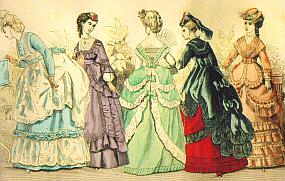Every now and then a post seems to erupt in the Godblogosphere. The latest is Denny Burk’s “A Sad Tale of Feminism Gone to Seed.” As they say, read the whole thing.
The gist of the Burk post is that feminism sold author Elizabeth Wurtzel (of Prozac Nation fame) a trunkload of hooey that resulted in the life she now decries in a New York Magazine article. Some of that lament:
It had all gone wrong. At long last, I had found myself vulnerable to the worst of New York City, because at 44 my life was not so different from the way it was at 24. Stubbornly and proudly, emphatically and pathetically, I had refused to grow up, and so I was becoming one of those people who refuses to grow up—one of the city’s Lost Boys. I was still subletting in Greenwich Village, instead of owning in Brooklyn Heights. I had loved everything about Yale Law School—especially the part where I graduated at 40—but I spent my life savings on an abiding interest, which is a lot to invest in curiosity. By never marrying, I ended up never divorcing, but I also failed to accumulate that brocade of civility and padlock of security—kids you do or don’t want, Tiffany silver you never use—that makes life complete. Convention serves a purpose: It gives life meaning, and without it, one is in a constant existential crisis. If you don’t have the imposition of family to remind you of what is at stake, something else will. I was alone in a lonely apartment with only a stalker to show for my accomplishments and my years.
I was amazed to discover that, according to The Atlantic, women still can’t have it all. Bah! Humbug! Women who have it all should try having nothing: I have no husband, no children, no real estate, no stocks, no bonds, no investments, no 401(k), no CDs, no IRAs, no emergency fund—I don’t even have a savings account. It’s not that I have not planned for the future; I have not planned for the present. I do have a royalty account, some decent skills, and, apparently, a lot of human capital. But because of choices I have made, wisely and idiotically, because I had principles or because I was crazy, I have no assets and no family. I have had the same friends since college, although as time has gone on, the daily nature of those relationships has changed, such that it is not daily at all. But then how many lost connections make up a life? There is my best friend from law school, too busy with her toddler; the people with whom I spent New Year’s in a Negril bungalow not so long ago, all lost to me now; every man who was the love of my life, just for today; roommates, officemates, classmates: For everyone who is near, there are others who are far gone.
Burk then adds his commentary:
Wurtzel famously has a knack for finding the dark side of everything. Certainly here she has found the dark side of feminism. There is a price to pay when one trades her birthright for a mess of pottage. The trap of feminism is that so few modern people can see it for the mess of pottage that it is. Even Wurtzel misses it, though she feels deeply the pain of it.
I do not believe feminism is to blame for all women who find themselves single. Nor do I think that feminism alone accounts for all the moral pathologies on display in Wurtzel’s article. But I do believe that feminism has provided the social context for women to be congratulated by the culture for sad choices that they make.
The comments on Burk’s site reveal that he went back and tempered the statement shown above to reduce some of the vitriol ladled out against feminism. Honestly, I wouldn’t backpedal. I think the brand of feminism that arose out of the 1960s has been at the root of a whole score of societal downturns and downright evils, many of which feminists themselves are only now—reluctantly—acknowledging.
But here’s my problem with Burk’s feminist straw man. I’ve known just as many Christian singles who have shared with me the same lament as Wurtzel’s, even down to the specifics.
Burk says the source of Wurtzel’s problem is feminism. But what is the source of the problem for Christian singles who are generational peers of Wurtzel’s? Can we still blame feminism? Or is the Church in the West somehow failing to address some lack in its vision?
I’ll be honest here. I have a strong aversion to pundits who like to throw stones at the glass house of “the bad guy” but who refuse to acknowledge the transparency and fragility of their own domicile. For some Christians, feminism is about as easy a target for stones as exists. Woo, how brave we are at mocking it!
Are we we doing anything about our own glass house, though? And if not, why expend energy to toss rocks at someone else’s house when we should be addressing our own inadequacies?
Here’s the fundamental problem in the Church in the West that leads to a similar lament among Christian peers of Wurtzel…
Wurtzel’s lament isn’t just about bad personal choices. In large part, it’s about broken community.
If you haven’t noticed, the Church in the West has not been stellar at combating breakdowns in societal structure and building up vital community. If anything, we’ve taken the majority of our energy and plowed it back into trying to shore up the nuclear family.
While building strong nuclear families is certainly a noble cause, could it be a case of the good being the enemy of the best?
A few comments by Jesus about family—and Gospel priorities:
And Peter said, “See, we have left our homes and followed you.” And he said to them, “Truly, I say to you, there is no one who has left house or wife or brothers or parents or children, for the sake of the kingdom of God, who will not receive many times more in this time, and in the age to come eternal life.”
—Luke 18:28-30 ESVAnd his mother and his brothers came, and standing outside they sent to him and called him. And a crowd was sitting around him, and they said to him, “Your mother and your brothers are outside, seeking you.” And he answered them, “Who are my mother and my brothers?” And looking about at those who sat around him, he said, “Here are my mother and my brothers! For whoever does the will of God, he is my brother and sister and mother.”
—Mark 3:31-35 ESV
And elsewhere it is noted:
To the unmarried and the widows I say that it is good for them to remain single as I am.
—1 Corinthians 7:8 ESVI want you to be free from anxieties. The unmarried man is anxious about the things of the Lord, how to please the Lord. But the married man is anxious about worldly things, how to please his wife, and his interests are divided. And the unmarried or betrothed woman is anxious about the things of the Lord, how to be holy in body and spirit. But the married woman is anxious about worldly things, how to please her husband. I say this for your own benefit, not to lay any restraint upon you, but to promote good order and to secure your undivided devotion to the Lord.
—1 Corinthians 7:32-35 ESVLet not the foreigner who has joined himself to the LORD say, “The LORD will surely separate me from his people”; and let not the eunuch say, “Behold, I am a dry tree.” For thus says the LORD: “To the eunuchs who keep my Sabbaths, who choose the things that please me and hold fast my covenant, I will give in my house and within my walls a monument and a name better than sons and daughters; I will give them an everlasting name that shall not be cut off.”
—Isaiah 56:3-5 ESV
The problem is that we don’t really believe or practice any of those verses.
If I were the keynote speaker at a Christian conference on marriage and family and said that I believe that the proper order of importance in my life, from most important to less important, is
- God
- Spouse
- My children
I would get a hearty round of Amens.
But if I said that I believe that this order and the words above from Jesus and other Bible authors say that I must also consider the following prioritized order
- Family of God
- My nuclear family
I would predict dead silence. Or close to it.
We simply don’t want to give Family of God the place it deserves. We’re not only averse to putting it before nuclear family, we’re not even sure it should rank as number two. Number one is completely out.
Is it any wonder then that single people “of a certain age” feel like the crazy aunt locked in the church attic? God may think differently, but we like our “eunuchs” to remain dry trees.
A man over 50 years of age visits your church. He seems devout, perhaps a bit too much so, and he talks about loving God, perhaps a bit too much. But for all his talk of love, he is unmarried and seems to want to stay that way. And while he is a great preacher, he dresses a bit frumpy and doesn’t seem to care for his personal appearance the way you think he should. He unnerves you because you can’t figure him out. You wonder about motives. Why is he single? What’s the story there? Really, he was never married? You begin to wonder about how safe your kids are around that man.
What if I told you that this was the Apostle Paul?
A lot of sincere Christian singles feel that same scorn in the Church. They know people are asking questions about them. They not only have to own up to their own decisions about life and whether or not they’ve made the right decisions,  but they have the married folks in the church second-guessing their decisions too. It’s a burden that Christian singles bear that their non-Christian counterparts may not always deal with. Which only makes it tougher.
but they have the married folks in the church second-guessing their decisions too. It’s a burden that Christian singles bear that their non-Christian counterparts may not always deal with. Which only makes it tougher.
Because we may have our priorities wrong with the Family of God and nuclear family, we can’t get community right. And singles are usually the first to suffer for that inability. Our communities not only prove to be unfulfilling to marrieds with children (who counter the lack by retreating further into their nuclear family), but those failed attempts at community let down singles even more. Single Christians suffer the same lament as Wurtzel of wondering where everyone went in their lives, and how is it that they get left out of whatever dregs of community exist? And why is it that when THEY go looking for some kind of human interaction to fill that void, and THEY make a mistake with handling it, THEY get singled out for righteous scorn?
Really, Church, just what are we offering better to singles with regard to community than what the broken world offers?
Denny Burk ends his article:
He did not make us unisex. He did not make us genderless humanoids with no direction for our intimate lives. He made us male and female. And for those to whom it has been given, He made us to give ourselves away to years of finding stale Cheerios in every hidden crevice of the minivan, to seasons of graduations and of anniversaries and of empty nests, to gray years with the love of your life who is your best friend, to lifetimes of covenant love.
Feminism is the killer of that dream, even though precious few seem to notice.
Note the odd pairing of and for those to whom it has been given with that dream. That’s the classic marriage/singleness dichotomy of Evangelicalism on display. We tell singles that their calling is a wonderful one, yet the married life is the real dream.
Here’s reality: Feminism should not be the killer of that dream. Jesus should be. And Evangelicals need to stop pushing one option as a “dream” and another as a “calling,” because when you come to Jesus, all bets about dream fulfillment are off. That idol should go away. And boy, have we made an idol of the nuclear family.
But the dream/idol talk persists because there’s not really much of anything else for people, at least when it comes to community, because we have yet to figure out how real Christian community works. Especially for those who are single. Which is why their lament sounds an awful lot like Wurtzel’s.
And we can’t easily blame that on feminism, now can we?


 Brian gets a little lopsided on who’s to blame for the sorry state of relationships.
Brian gets a little lopsided on who’s to blame for the sorry state of relationships.